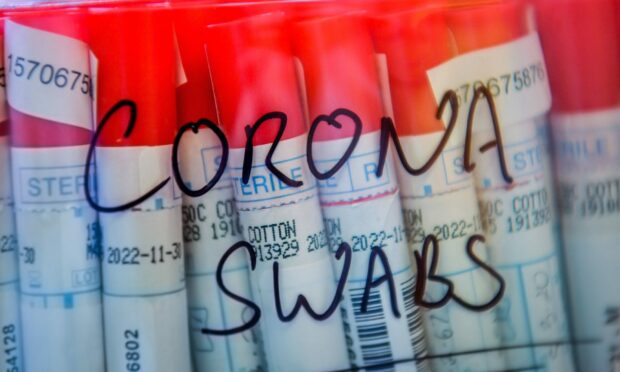The number of people in hospital with Covid-19 in Tayside is continuing to rise as dedicated wards get ready for an expected busy July.
Patients jumped from 21 to 36 between Wednesday and Thursday and further again to 46 on Friday — the highest since February 16 at the tail end of the second wave.
Public health expert Linda Bauld picked out the region as an area of particular concern on Friday morning and warned services in the region are under “genuine strain”.
High staff absence rates mostly due to self-isolation are adding to the difficulties, as is the fact the NHS is very busy tackling waiting lists from appointments delayed during the pandemic.
Officials say many of those in hospital are under 40 in Tayside but that patients are spread across all age ranges.
They also said patients are a mixture of people who are unvaccinated, have had one dose, or have received both doses.
Dundee now has the highest Covid rate in the whole of the UK both over the past seven days and 14 days.
The city’s young and unvaccinated population is believed to be driving the sky-high numbers.
When asked, NHS Tayside did not rule out non-Covid appointments and procedures being suspended again soon to cope with the increased pressure.
A spokesperson said: “Our Covid-19 wards in Ninewells remain busy and there are now 46 patients with Covid in the hospital.
“As has been the case when we have been managing other spikes in Covid cases in Tayside, clinical teams continuously monitor the impact of the increase in cases and there are detailed plans to respond to developing situations.
“Of course, the most important element of all of our plans is patient safety.
“At the moment, we have three Covid-19 wards opened in Ninewells as well as the Covid Intensive Care and High Dependency Unit.
“Our escalation response to any further increases in cases will be on the same phased basis as we did at the height of the second wave back in January with further Covid beds opening if they are required.”
No change in restrictions for now
The Scottish Government say there will be no review of restrictions until mid-July, despite the increasing pressures.
A spokesperson said: “The number of new cases is still a cause for concern and we are closely monitoring the situation.
“It was anticipated cases would rise as, with the agreement of Parliament, we moved out of lockdown restrictions and we are continuing to closely monitor hospitalisation data.
“As the Health Secretary and First Minister have said, the Delta variant which accounts for the overwhelming bulk of all new cases, is significantly more transmissible than previous variants and is helping to driving the recent steep rise in cases.
“We owe a huge debt of gratitude to NHS and social care staff, and we are working closely with NHS boards to ensure staff continue to be well-supported and effectively deployed in sufficient numbers, co-ordinating capacity across boards to make up shortfalls.”
It is hoped the next two weeks will see a large number of second doses delivered, as well as first doses for people aged 18-29.
NHS Tayside predict it will be at least another two months before the entire eligible adult population is fully vaccinated.
The government spokesperson added: “While the increase in NHS staff absences over recent weeks is significantly lower than previous phases of the pandemic, this reflects the overall increase in infection rates across the population and each of us needs to do all we can to slow the spread of the virus.
“The number of infections and hospitalisation will be considered as part of the next review of restrictions in a couple of weeks and, as we work hard to get even more people vaccinated, we would ask everyone to continue to follow vital health advice on social distancing, wearing masks and washing their hands.”
